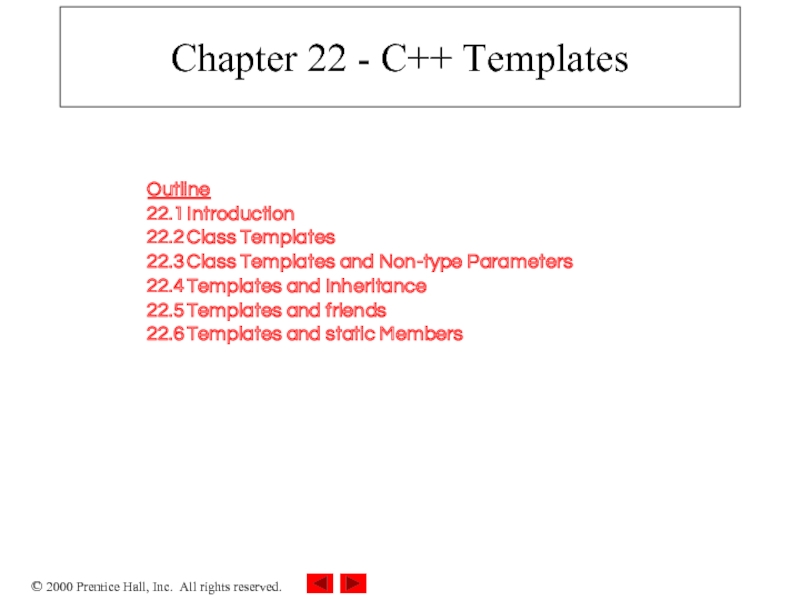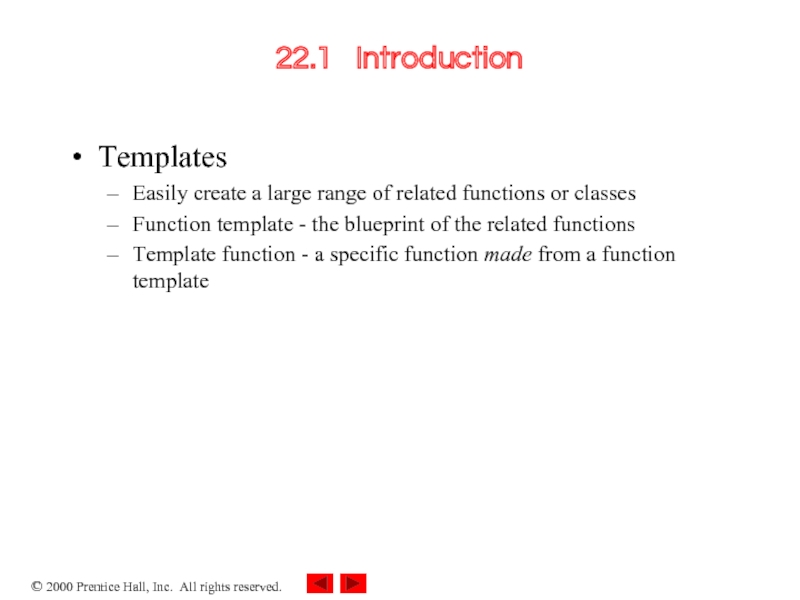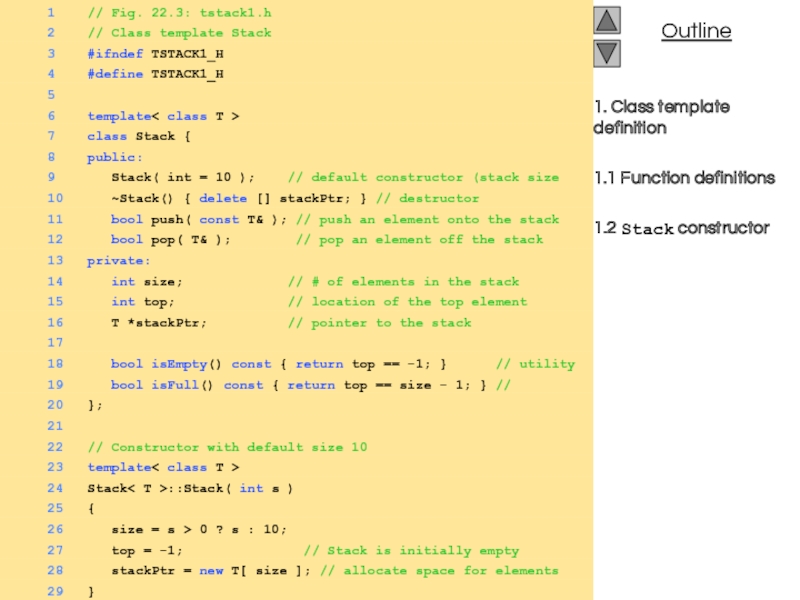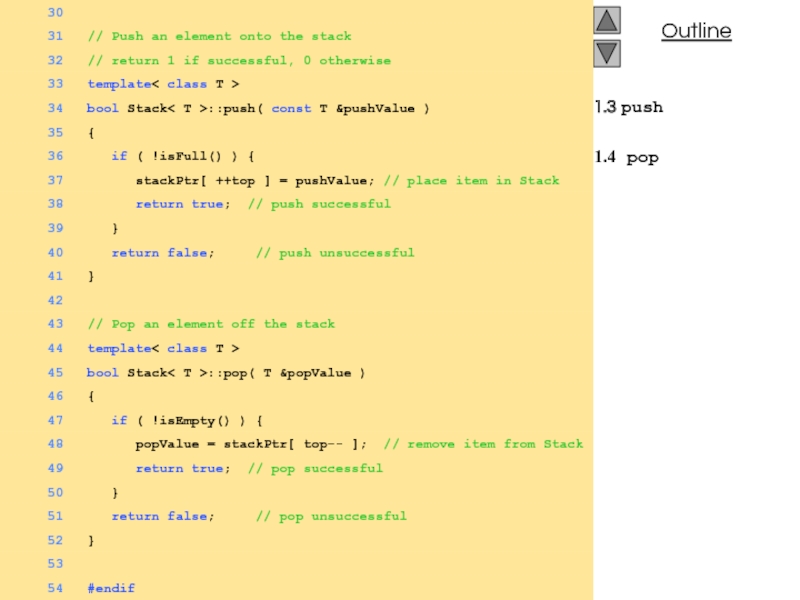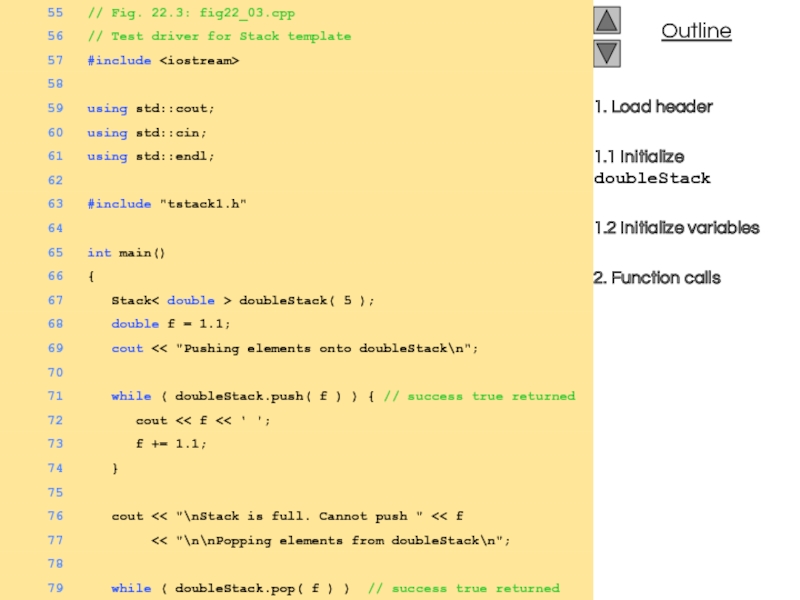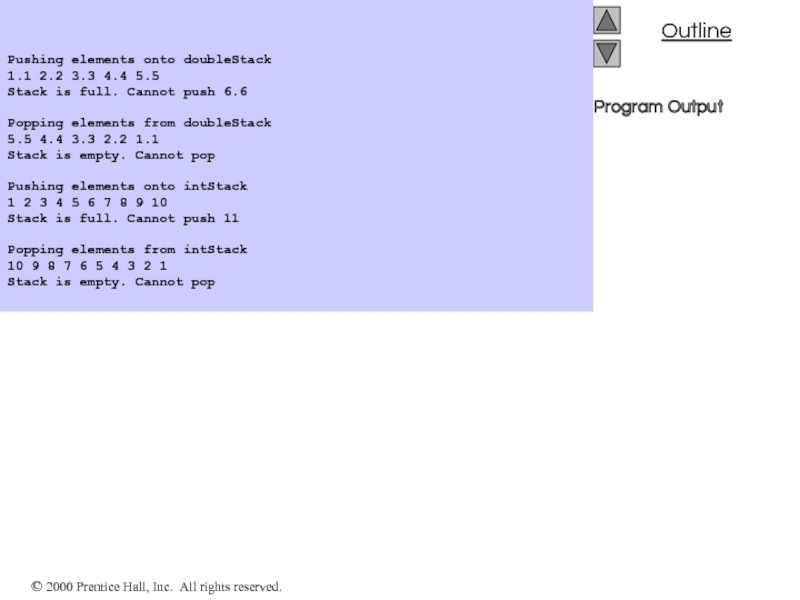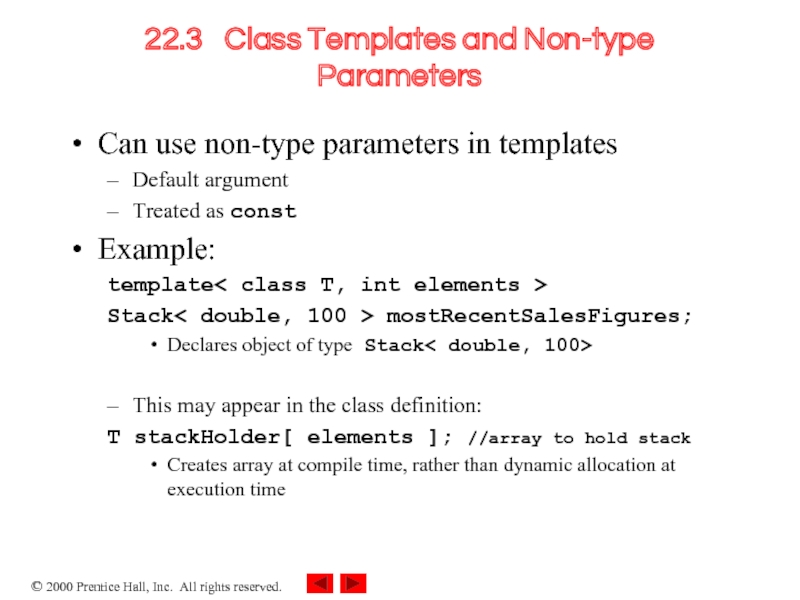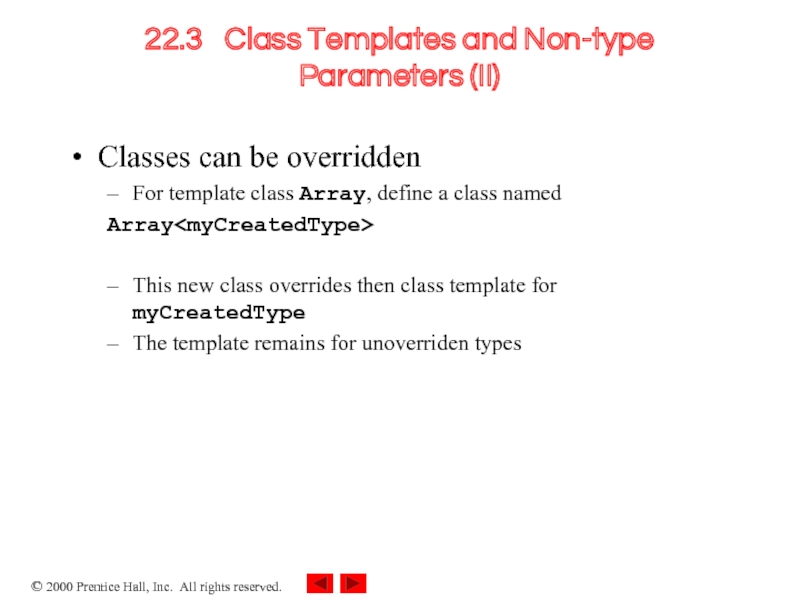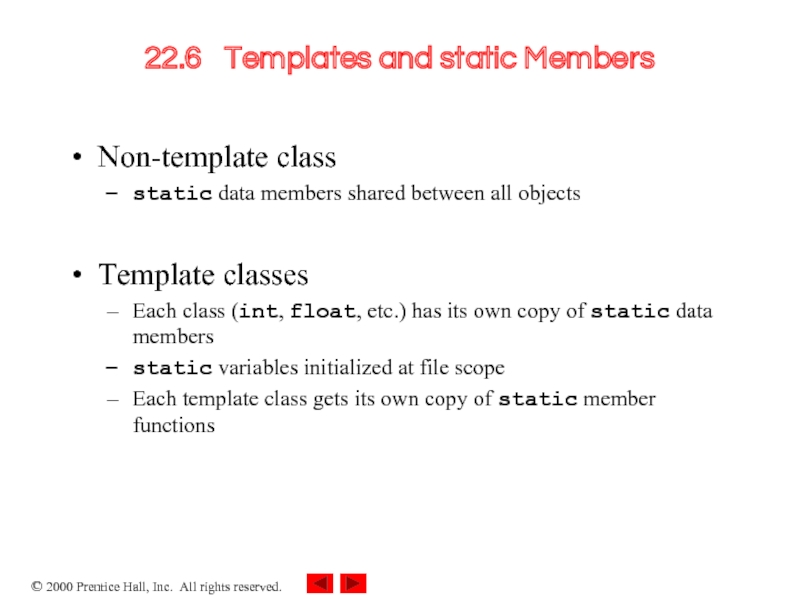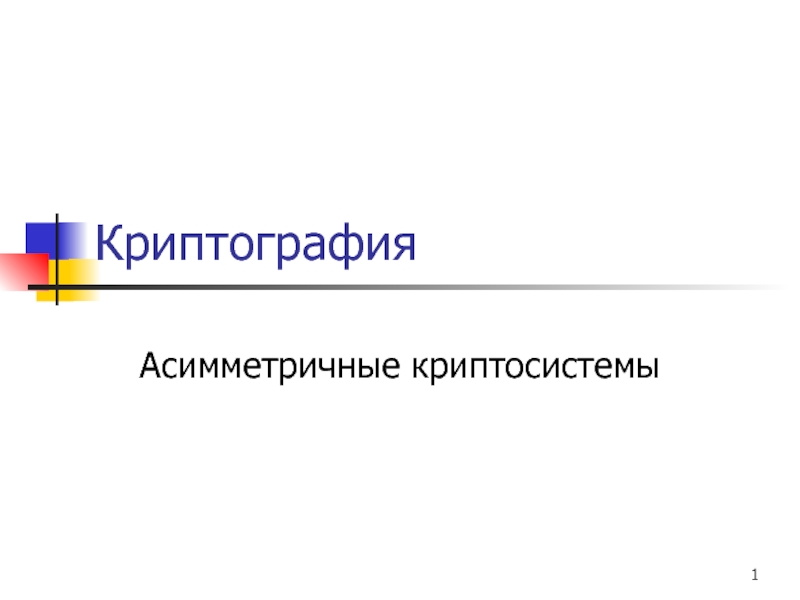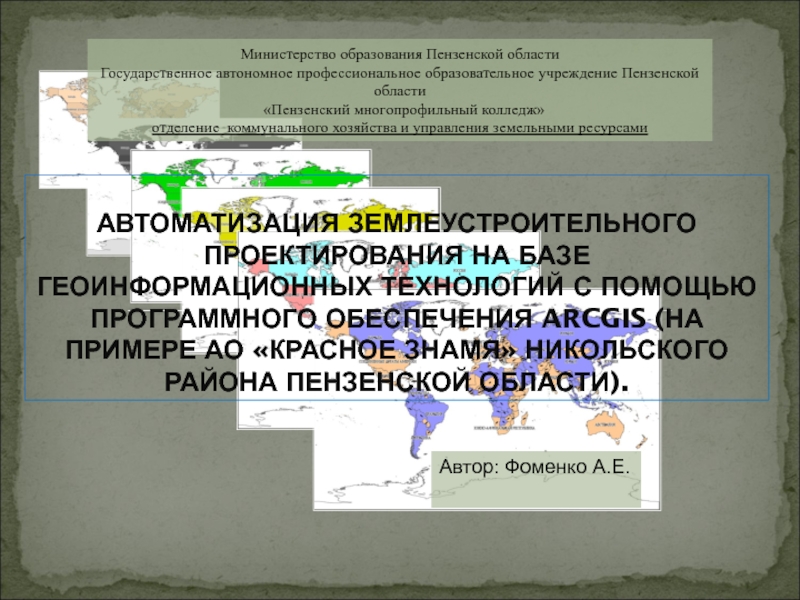Inheritance
22.5 Templates and friends
22.6 Templates and static Members
- Главная
- Разное
- Дизайн
- Бизнес и предпринимательство
- Аналитика
- Образование
- Развлечения
- Красота и здоровье
- Финансы
- Государство
- Путешествия
- Спорт
- Недвижимость
- Армия
- Графика
- Культурология
- Еда и кулинария
- Лингвистика
- Английский язык
- Астрономия
- Алгебра
- Биология
- География
- Детские презентации
- Информатика
- История
- Литература
- Маркетинг
- Математика
- Медицина
- Менеджмент
- Музыка
- МХК
- Немецкий язык
- ОБЖ
- Обществознание
- Окружающий мир
- Педагогика
- Русский язык
- Технология
- Физика
- Философия
- Химия
- Шаблоны, картинки для презентаций
- Экология
- Экономика
- Юриспруденция
C++ templates презентация
Содержание
- 1. C++ templates
- 2. 22.1 Introduction Templates Easily create a large
- 3. 22.2 Class Templates Class templates Allow type-specific
- 4. 22.2 Class Templates (II) Template class functions Declared
- 5. 1. Class template definition 1.1 Function definitions 1.2 Stack constructor
- 6. 1.3 push 1.4 pop
- 7. 1. Load header 1.1 Initialize
- 8. 2. Function calls 3. Output
- 9. Program Output Pushing
- 10. 22.3 Class Templates and Non-type Parameters Can use
- 11. 22.3 Class Templates and Non-type Parameters (II) Classes
- 12. 22.4 Templates and Inheritance A class template can
- 13. 22.5 Templates and friends Friendships allowed between a
- 14. 22.5 Templates and friends (II) friend void C<
- 15. 22.6 Templates and static Members Non-template class
Слайд 1Chapter 22 - C++ Templates
Outline
22.1 Introduction
22.2 Class Templates
22.3 Class Templates and Non-type Parameters
22.4 Templates and
Слайд 222.1 Introduction
Templates
Easily create a large range of related functions or classes
Function
template - the blueprint of the related functions
Template function - a specific function made from a function template
Template function - a specific function made from a function template
Слайд 322.2 Class Templates
Class templates
Allow type-specific versions of generic classes
Format:
template
class
ClassName{
definition
}
Need not use "T", any identifier will work
To create an object of the class, type
ClassName< type > myObject;
Example: Stack< double > doubleStack;
definition
}
Need not use "T", any identifier will work
To create an object of the class, type
ClassName< type > myObject;
Example: Stack< double > doubleStack;
Слайд 422.2 Class Templates (II)
Template class functions
Declared normally, but preceded by template
Generic
data in class listed as type T
Binary scope resolution operator used
Template class function definition:
template
MyClass< T >::MyClass(int size)
{
myArray = new T[size];
}
Constructor definition - creates an array of type T
Binary scope resolution operator used
Template class function definition:
template
MyClass< T >::MyClass(int size)
{
myArray = new T[size];
}
Constructor definition - creates an array of type T
Слайд 9
Program Output
Pushing elements onto doubleStack
1.1 2.2 3.3 4.4 5.5
Stack is full.
Cannot push 6.6
Popping elements from doubleStack
5.5 4.4 3.3 2.2 1.1
Stack is empty. Cannot pop
Pushing elements onto intStack
1 2 3 4 5 6 7 8 9 10
Stack is full. Cannot push 11
Popping elements from intStack
10 9 8 7 6 5 4 3 2 1
Stack is empty. Cannot pop
Popping elements from doubleStack
5.5 4.4 3.3 2.2 1.1
Stack is empty. Cannot pop
Pushing elements onto intStack
1 2 3 4 5 6 7 8 9 10
Stack is full. Cannot push 11
Popping elements from intStack
10 9 8 7 6 5 4 3 2 1
Stack is empty. Cannot pop
Слайд 1022.3 Class Templates and Non-type Parameters
Can use non-type parameters in templates
Default argument
Treated
as const
Example:
template< class T, int elements >
Stack< double, 100 > mostRecentSalesFigures;
Declares object of type Stack< double, 100>
This may appear in the class definition:
T stackHolder[ elements ]; //array to hold stack
Creates array at compile time, rather than dynamic allocation at execution time
Example:
template< class T, int elements >
Stack< double, 100 > mostRecentSalesFigures;
Declares object of type Stack< double, 100>
This may appear in the class definition:
T stackHolder[ elements ]; //array to hold stack
Creates array at compile time, rather than dynamic allocation at execution time
Слайд 1122.3 Class Templates and Non-type Parameters (II)
Classes can be overridden
For template
class Array, define a class named
Array
This new class overrides then class template for myCreatedType
The template remains for unoverriden types
Array
This new class overrides then class template for myCreatedType
The template remains for unoverriden types
Слайд 1222.4 Templates and Inheritance
A class template can be derived from a template
class
A class template can be derived from a non-template class
A template class can be derived from a class template
A non-template class can be derived from a class template
A class template can be derived from a non-template class
A template class can be derived from a class template
A non-template class can be derived from a class template
Слайд 1322.5 Templates and friends
Friendships allowed between a class template and
Global function
Member function of another class
Entire class
friend functions
Inside definition of class template X:
friend void f1();
f1() a friend of all template classes
friend void f2( X< T > & );
f2( X< int > & ) is a friend of X< int > only. The same applies for float, double, etc.
friend void A::f3();
Member function f3 of class A is a friend of all template classes
Слайд 1422.5 Templates and friends (II)
friend void C< T >::f4( X< T >
& );
C::f4( X< float> & ) is a friend of class X only
friend classes
friend class Y;
Every member function of Y a friend with every template class made from X
friend class Z;
Class Z a friend of class X, etc.
C
friend classes
friend class Y;
Every member function of Y a friend with every template class made from X
friend class Z
Class Z
Слайд 1522.6 Templates and static Members
Non-template class
static data members shared between
all objects
Template classes
Each class (int, float, etc.) has its own copy of static data members
static variables initialized at file scope
Each template class gets its own copy of static member functions
Template classes
Each class (int, float, etc.) has its own copy of static data members
static variables initialized at file scope
Each template class gets its own copy of static member functions
